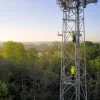UK Sky Broadband ISP Customers Hit by Internet Piracy Threat Letters
As predicted some users of Sky Broadband, specifically those who are accused of sharing unlawful copies of the movie The Company You Keep (TCYK) over public BitTorrent file sharing (P2P) networks, are beginning to receive letters from a copyright firm (TCYK LLP) that demand compensation.
The so-called “Speculative Invoicing” culture is sadly nothing new, although the tactics remain questionable. Related organisations usually track public Internet Protocol (IP) addresses on P2P networks and then later submit a Norwich Pharmacal Order (NPO) to a court, which forces the linked ISP (e.g. Sky) to release details about any associated subscribers.
Advertisement
Shortly after that the copyright firm or a lawyer acting on their behalf will then pursue those subscribers with worry inducing letters, which usually contain veiled threats in the hope of either tricking the subscriber into incriminating themselves or paying up to avoid the threat of court action.
In reality related court cases are usually too expensive to pursue and most of those that have been attempted tend to fail due to a lack of solid evidence. Indeed IP address based evidence is notoriously flaky, not least because it may be incorrect or fail to reflect that many people can share a single Internet connection.
The letters themselves naturally go after the bill payer, who may have no idea that such activity has taken place (assuming it even took place at all). Back in March 2015 Sky Broadband warned some of their users to expect just such a letter (here) and today TorrentFreak notes that the first such communications are finally being received.
Extract from TCYK LLP’s Letter to Sky Subscribers
Our forensic computer analyst has provided us with evidence that on the following UK date and time, [redacted], all or part of the Work was made available from the internet protocol (or IP) address [redacted], specifically for the purpose of downloading by third parties.
…
In the event that you were not responsible for the infringing acts outlined above because, for example, another member of your household was the user of the computer, you should make full disclosure to us of the other parties at your residence using your internet connection to make the Work available for download.
A failure to make such disclosure may lead to the claim being made against you with the court being asked to conclude, on the balance of probabilities that you were the user of the computer. … We will propose an appropriate figure to you in the subsequent letter after we have received your response to this letter and carefully considered its contents.
Generally speaking, if you know or believe yourself to be innocent of the allegation, then it’s best to discuss the matter with Citizens Advice before responding and read the Speculative Invoicing Handbook. In many cases though it may be better not to respond at all and if you want a solicitors help then Michael Coyle from Lawdit has agreed to step in.
Advertisement
Customers should not be afraid to challenge an allegation if you feel it to be false and history shows that it’ll often cost the firm a lot more money than they’ll get back to pursue such a case through the courts.
Last year all of the country’s largest broadband ISPs agreed to a new Voluntary Copyright Alert Programme (VCAP), which will also send warning letters to those suspected of similar activity (here). But the VCAP letters will contain no threats or demands for money and should only act as an “education programme“.
The first phase of the new VCAP system was originally due to be introduced before the end of this spring, although we haven’t seen much activity on this front yet.
Mark is a professional technology writer, IT consultant and computer engineer from Dorset (England), he also founded ISPreview in 1999 and enjoys analysing the latest telecoms and broadband developments. Find me on X (Twitter), Mastodon, Facebook, BlueSky, Threads.net and Linkedin.
« UK ISP PlusNet Offers Unlimited Broadband FREE for 12 Months
















































Comments are closed